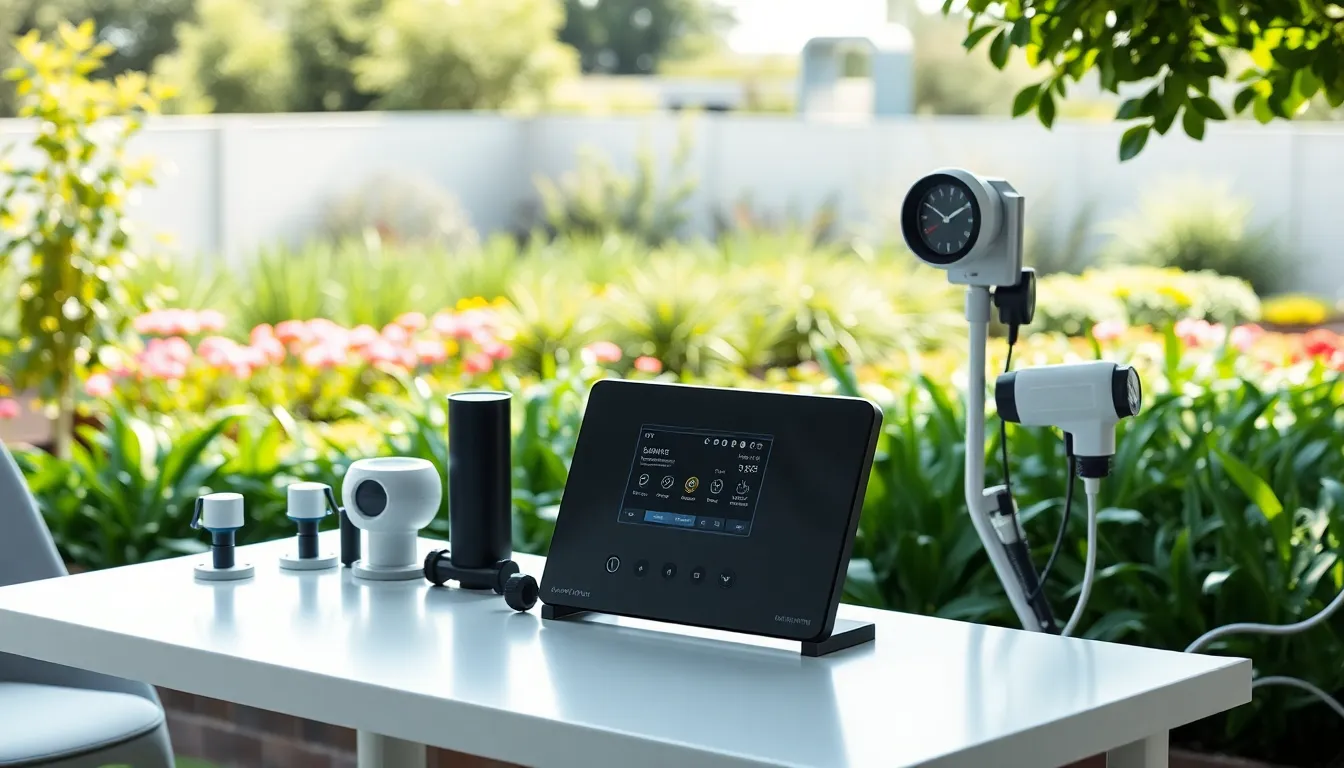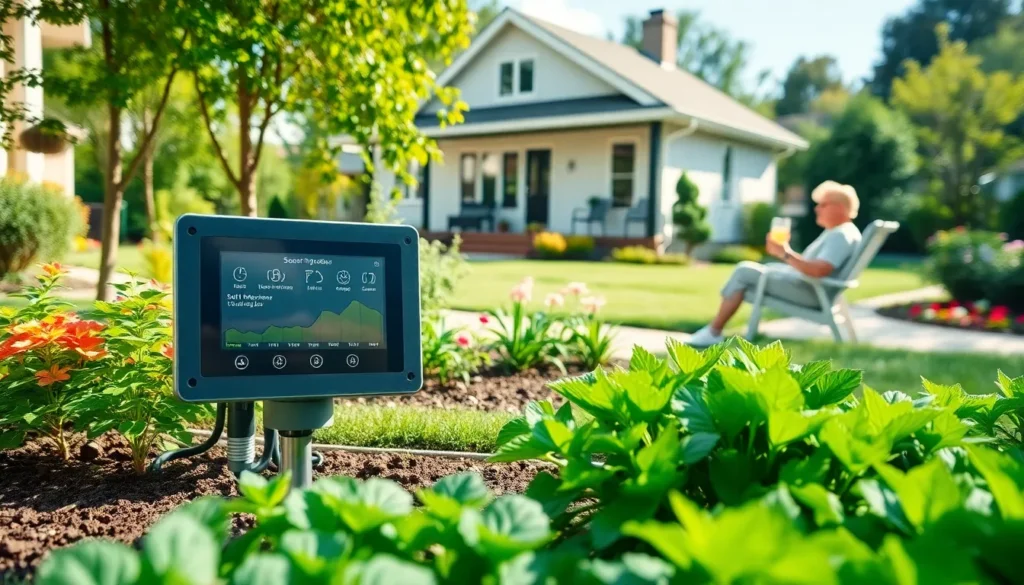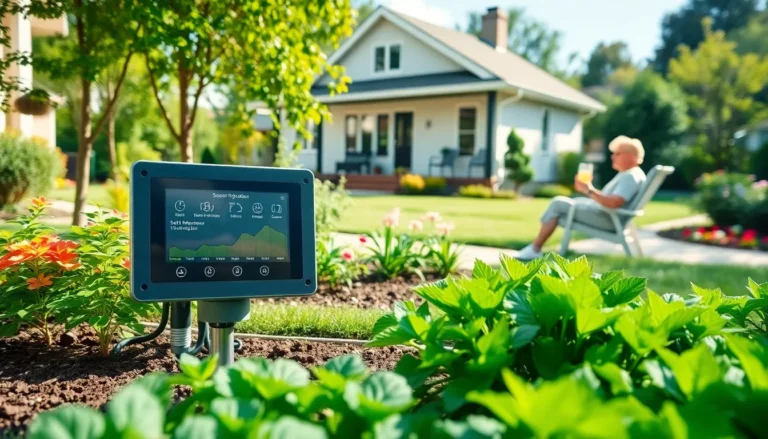Table of Contents
ToggleImagine a world where your garden waters itself while you sit back sipping lemonade. Sounds like magic? Welcome to smart irrigation, an innovation that might just be the flibbertigibbet of modern gardening or, dare we say, a game-changer. As homeowners look to make eco-friendly choices, smart irrigation systems leap into the spotlight, promising luxury with a sprinkle of sustainability. Get ready to explore why this tech trend deserves your attention.
Understanding Smart Irrigation Systems

Key Components of Smart Irrigation
Smart irrigation systems aren’t just high-tech gadgets: they’re composed of fundamental components working harmoniously to optimize water use. Imagine sensor technology, weather data integration, and the ability to schedule watering based on plant needs. At their core, these systems rely on:
- Smart controllers that manage watering schedules with precision.
- Soil moisture sensors that gauge when plants truly need water.
- Flow sensors to monitor and regulate water flow, avoiding over-watering.
- Weather stations or API integrations that forecast rain and adjust schedules accordingly.
These elements combine to create a seamless watering experience.
How Smart Irrigation Works
Let’s jump into how these systems function. First, sensors measure soil moisture and local weather conditions. If the soil is dry and sunny, the controller springs into action, triggering sprinklers or drip systems to deliver water. If an unexpected rainstorm hits, the same controller stops the watering schedule, saving water and reducing bills. Essentially, smart irrigation systems use data to work smarter, not harder.
Benefits of Smart Irrigation for Homeowners
Water Conservation and Sustainability
Even the most seasoned gardeners can agree, finding a way to make their gardens flourish without draining resources is essential. Smart irrigation offers impressive water conservation benefits. These systems not only use weather data and moisture sensors but also adapt their schedules in real time, ensuring water is only used when necessary. In a time of looming water shortages, homeowners can positively impact the environment by making the switch to these systems. The bottom line? Using less water helps keep gardens lush while championing sustainability.
Cost Savings and Efficiency
Let’s talk about those glorious savings. Who wouldn’t want to pay less on their water bill? With smart irrigation systems, homeowners often see a reduction in water usage of up to 50%. Imagine what that could mean for your bank account over time. Plus, with the efficiency these systems offer, such as precision watering and automatic adjustments, you can rest easy knowing that your watering method is optimized for both the environment and your wallet.
The Role of Technology in Smart Irrigation
Smart Sensors and Automation
Advancements in technology brought forth smart irrigation solutions that operate more like a smartphone than a traditional sprinkler. Smart sensors play a pivotal role, sending real-time data about soil conditions, environmental changes, and plant needs to the controller. This data-driven approach ensures that every drop of water counts. Homeowners can also monitor these systems remotely via apps, making adjustments from anywhere, whether they’re lounging on a beach or binge-watching their favorite show.
Integration with Home Automation Systems
Integration is the name of the game in today’s tech-savvy world. Many smart irrigation systems can connect with existing home automation setups. This means that the gardener can sync irrigation schedules with other systems, like smart weather stations and home energy management tools. The result? A holistic approach to home management that enhances efficiency and boosts convenience.
Choosing the Right Smart Irrigation System
Factors to Consider When Selecting a System
When on the hunt for the perfect smart irrigation system, several factors come into play. Homeowners should consider:
- Budget: Determine how much you’re willing to invest. Some systems can start on the lower end of the spectrum, while others might be pricier due to advanced features.
- Your landscape’s needs: The size and type of garden will dictate what system works best. A large landscape may require multiple sensors, while a smaller garden might benefit from a single set-up.
- Connectivity options: Ensure your chosen system fits well with your home’s Wi-Fi capabilities and existing tech.
These considerations will ensure that the system chosen is not just compatible but enhances the homeowner’s gardening experience.
Popular Brands and Models in Smart Irrigation
There are several reputable brands leading the way in smart irrigation. Names like Rachio, Orbit, and RainMachine have become household terms for those looking to upgrade their gardening game. Each brand offers unique features, from app integrations to ultra-responsive sensors. Homeowners should research and compare these brands to find the best fit based on their specific watering needs and preferences.
The Future of Smart Irrigation in Real Estate
Impacts on Property Value and Market Trends
As smart home technology continues to evolve, smart irrigation systems are becoming vital for property value. Real estate experts suggest that homebuyers are increasingly seeking features that promote sustainability. By adopting smart irrigation, homeowners could see an uptick in property resale value, as these systems are viewed as desirable eco-friendly amenities. This represents a significant shift in market dynamics, emphasizing smart technology’s central role as a selling point.
Adopting Smart Irrigation in Residential Real Estate
For property developers and real estate agents, promoting smart irrigation systems provides an edge in a competitive market. Offering homes equipped with these systems not only attracts environmentally-conscious buyers but also sets a bar for sustainable living that enhances overall quality of life. As the trend matures, it becomes evident that integrating smart irrigation into residential real estate isn’t merely an option, it’s becoming a necessity.






